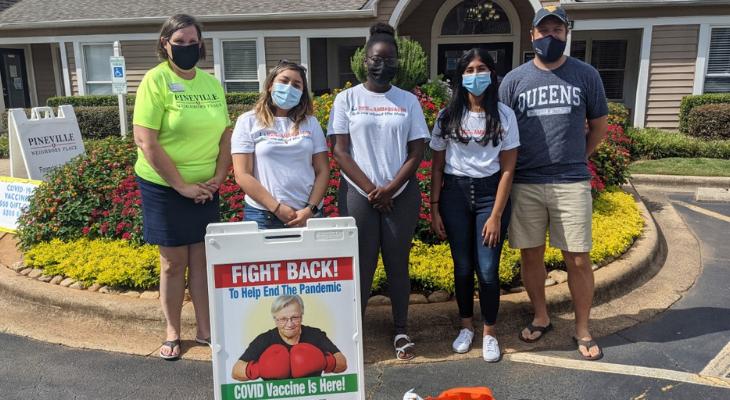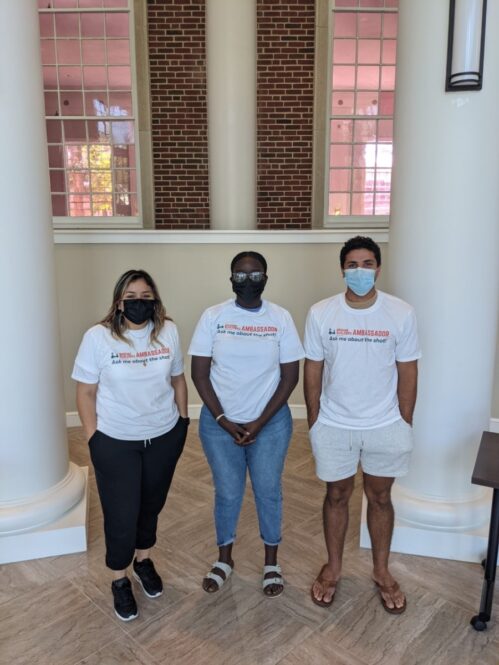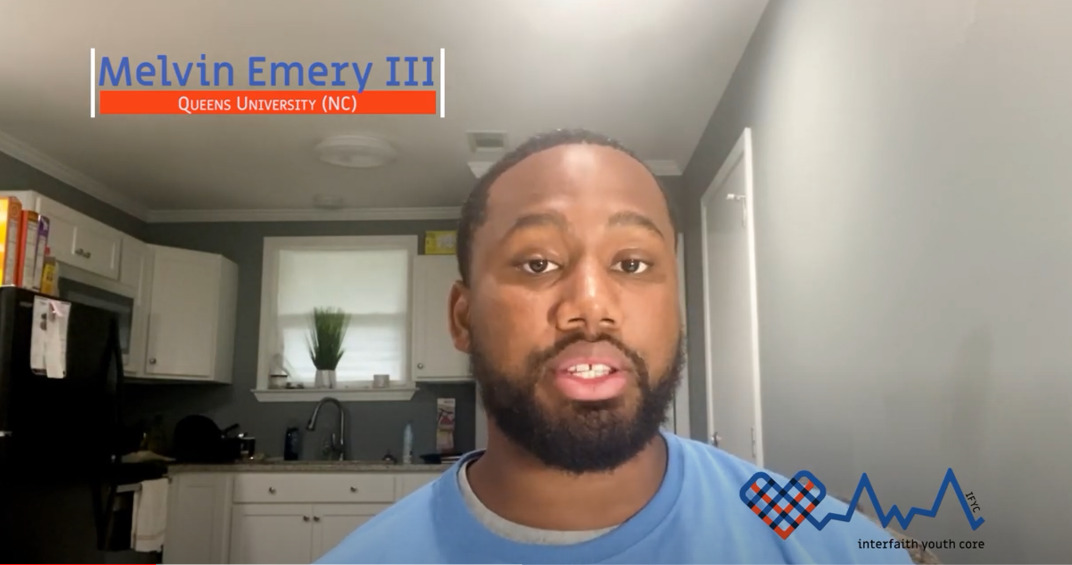Want to Increase Vaccine Uptake? North Carolina Students Say ‘Look at Each Other in a Humane Way’
April 18, 2022

How do you talk about the Covid vaccine, particularly with people in marginalized groups who may be vaccine hesitant? Last year, Queens chaplain and a dedicated group of Queens students did just that, as part of the national Faith in the Vaccine initiative. Chaplain Joey Haynes, who has been spearheading the initiative in the Queens community and Charlotte, summed up the initiative as a space in which the “goal is to reach out to marginalized communities and have conversations surrounding vaccine hesitancy. Not in a way to push people to take the vaccine but in a way to think more deeply about what community looks like and to open a dialogue. We want to support community organizations that are already doing the work by helping to provide them with resources such as funding, information, and good humans.”
Haynes gathered a group of passionate students, and together, they got to work. They put themselves in position to be outreach coordinators, to sit at soccer games and teach people about the vaccine, and to offer support to the community in whatever spaces they could.
Share
Related Articles
American Civic Life
Faith Based Efforts Work in Vaccine Uptake: Now Let’s Make it Easy
American Civic Life
Higher Education

Right to Left, Queens students Matilde Sanchez, Rose Sall, Lucca Ferreira. Courtesy photo
Faith in The Vaccine, an initiative started by the Interfaith Youth Core based out of Chicago, and supported by the White House, attempts to bridge the gap between religion and vaccine hesitancy across the continental United States.
The initiative is also an attempt to to reach herd immunity, which is a short term stating that the majority of a population is immune to a specific disease. Haynes noted that the vaccine does not belong within the binary of vax vs. anti-vax, but instead within the confines of access to education.
He stated that a “a lot of people in the middle weren’t anti-vax, but that they were hesitant for various other reasons. For example, impaired relationships with the medical community caused marginalized groups to be more weary of receiving the vaccine.” He continued, saying that “faith communities are a large percentage of the population and are necessary to tap into to reach herd immunity.” The initiative was less focused on “convincing people to receive the vaccine, but on healing relationships between marginalized religious communities and the medical community.”
The “Faith in the Vaccine” initiative at Queens was started in May 2020, and planned as a year-round coalition. Funding was received through the Duke Endowment and other grant money, with the initial focus being on responding to neighborhood needs. Haynes said that “there was no formal plan to start this thing. We just saw something that needed to be done and decided to just do our thing. Help out the people around us.”
Matilde Sanchez, Queens student, said the outreach process was one of great importance. Her role was one of being a vaccine student ambassador on campus and working in outreach spaces by creating the educational and informative material for Queens Vaccine Outreach events. Through this initiative, she has been able to do community outreach through vaccines clinics such as the Pineville clinic.
Sanchez also interviewed Dr. Singh, a professor of medicine, about his religion and how it has informed his perspective on the vaccine. She said that “the most satisfying thing about outreach is seeing people want to get vaccinated/getting vaccinated. When we did the vaccine clinic on campus and found out 100 people got vaccinated, it was an amazing feeling to know that with information and resources, we can get more and more people protected.”

FIVA Ambassor at Queens. Video screen grab
She continued by expressing her excitement about how she was given the ability to work in outreach in a way she never had before. She said that she “had not done this type of outreach or this level before. What drove me to want to be a part of it was that it was becoming a crucial moment where we needed more people to share facts to try and fight against the misinformation. This was something we hadn’t dealt with before, and I wanted to help protect the people around me and also be on the right side of history. I learned that outreach is so important. That being there and offering services, resources, and knowledge will help create the change you want to see. That our voices are powerful. But also that listening is a key factor to being understanding. You can’t create change without listening first.”
Rose Sall, a senior at Queens, also explained how this initiative allowed her the space to work on her outreach skills and dive further into her love for learning about other people. The experience also allowed her to discuss a subject of extreme importance. “This really was the first step to all of us looking at each other in a humane way,” was one of her closing remarks.
Haynes summed up the program: “This work is not about recognition, or being right or wrong, but recognizing and supporting community organizations that are already doing great work. We have the funding, so we might as well pour it back into the community that it truly belongs within.”
Check out their podcast on their work, Faith in our Community:
Related Audio



